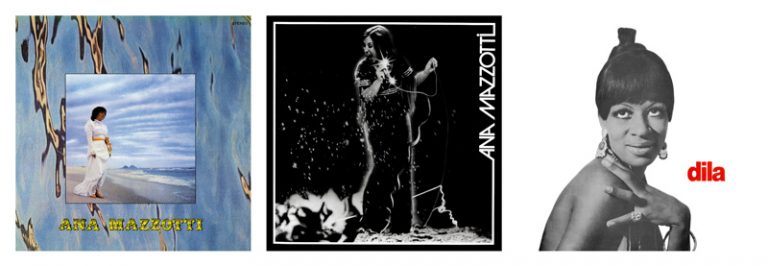
Brazilian Reissue Round-Up: Ana Mazzotti, Dila
29 July, 2019From 1970s Brazil, a troubled time when the military junta’s crack-down on radicalism and self-expression drove artists like Gilberto Gil and Caetano Veloso into exile, comes a double blast from the past courtesy of Far Out Recordings. It’s a blast full of melody and tragedy, signifying two fascinating and worthwhile reissues.
Ana Mazzotti:
Ningem Vai Me Segurar (1974)
Ana Mazzotti (1977)
Far Out Recordings
***
In actual fact, it’s a double-double blast from the past. Three years after releasing her first record, Ana Mazzotti went back into the studio with roughly the same band to tinker with the first album, which had been recorded independently on a slender budget without much publicity or commercial success. This can often be a recipe for pomposity in the form, say, of syrupy strings and bombastic orchestrations. The singer re-recorded her vocals, added some tasteful horns, changed the running order and replaced the dispensable cover of Roberta Flack’s “Feel Like Makin’ Love” with the short, sweet and jaunty “Éta Samba Bon”. Apart from “Canto de Meditação” – which gets bogged down with added strings, heavenly choir and a piano sound that’s re-vamped to suggest a saloon somewhere in the Wild West – she managed to resist over-egging the pudding. Quite rightly so. The band on both occasions included two thirds of Azymuth, fresh from their own initial sessions in the same São Paulo studio. Alex Malheiros is there on guitars and bass, and José Roberto Bertrami contributes his signature synth and keyboards, as well as all the arrangements and several co-compositions with the talented Ms. Mazzotti. As a singer, she has a pleasing laconic timbre to her voice, with a hint of Dionne Warwick and a lower-register Joyce Moreno, that’s complemented by the basic backing band and the unfussy arrangements of her songs.
On ‘both’ albums, the drummer and producer was her future husband, Romildo Santos, whose influence was probably most pronounced in his introduction to her of jazz – and in particular Hermeto Pascaol, with whom she would perform and who would dub her “a super musician”. Before moving to São Paulo, Ana Mazzotti had learnt the accordion and piano during her childhood and, at age 12, conducted her convent school’s choir. In the Swinging Sixties, she fronted an all-female Beatles cover band and an eight-piece psychedelic group by the name of Desenvolvemento. But it’s an ‘Azymuthian’ funky-jazz feel that pervades her two solitary encounters with a recording studio. Infused with elements of samba, bossa nova and even disco, the 10 tracks on either version all come in at around the two-to three-minute mark. She is equally comfortable with slower numbers, like the “Dindi”-esque “De Um Jeito So” and the lovely “Sou”, and with mid-tempo songs such as the quintessentially ‘70s “Agora Ou Nunca Mais”, “Bairro Negro”, the slightly Sly-like “Eu Sou Mais Eu” and my nomination for the best track on the album(s), “Roda Mundo”.
You could argue the case for one album over the other – and it’ll be fun to compile a digital version that picks ‘n’ mixes the best renditions from the two recordings – but Ana Mazzotti left a quietly compelling legacy when she sadly and prematurely succumbed to cancer in her mid-30s.
Dila
Dila (1971)
Far Out Recordings
***
Another little known chanteuse, another premature departure – in this case, reportedly, via a car crash shortly after the release of her only album, three years before Ana Mazzotti’s debut. Other than the fact that Dila is pronounced Jee-la, we know very little about her: she came from Rio and her velvety voice sounds not unlike Celia’s. Arnoldo Medeiros, composer of several of the 12 up-tempo numbers here, warns us in his hyperbolic liner notes for the original record: “When this girl starts to sing, you’re in trouble.”
Certainly, her output is more dynamic, say, than Ana Mazzotti’s – but it also lacks some of her colour and variety. The songs are in the main joyful soulful sambas redolent of Rio’s favelas and the times, arranged with the minimum of fuss (and variety) by producer Durval Ferreira, and performed by his house band, Os Grillos (The Crickets): a line-up of bass, drums, piano, percussion and, somewhat curiously, trumpet (courtesy of a chap called Christ, who sounds like a cross between Hugh Masekela and Herb Alpert). On tracks like “Fin de Papo” and Dila’s interpretation of “Madalena”, the Ivan Lins number forever linked with Elis Regina, the piano gets a little submerged in the mix. It’s a welcome change of pace and sound half-way through, when the piano sits out in favour of Ferreira’s acoustic guitar and the trumpet is muted on a lovely version of Jobim and de Moraes’ “O Morro Não Tem Vez”. But these are minor carps that don’t detract from an enjoyable album that once was lost but now is found, re-mastered and pressed on 180g vinyl.
It’s a stretch to describe either Dila’s or Ana Mazzotti’s album as a lost classic. Compare and contrast with, say, an earlier and beautiful Far Out release by another singer whose young life was cut off in its prime: José Mauro’s mournful and exquisite Obnoxius. But they sit well together as compelling testaments to an era when, notwithstanding the political climate, exciting new sounds were emerging from the Brazilian melting pot.
Follow Sounds and Colours: Facebook / Twitter / Instagram / Mixcloud / Soundcloud / Bandcamp
Subscribe to the Sounds and Colours Newsletter for regular updates, news and competitions bringing the best of Latin American culture direct to your Inbox.

